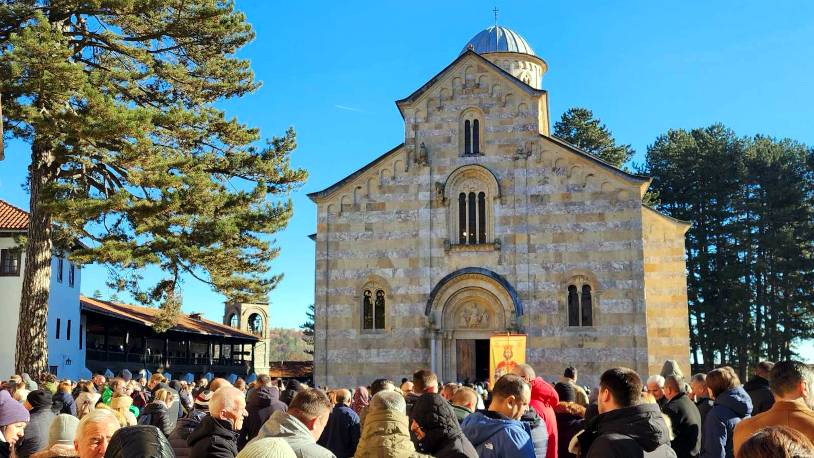
Miracle in Dečani
“What has brought so many people to Dečani?” asks Mrs. Vuković, who lives in Metohija in a returnee village and almost never leaves it. The world rarely enters her closed ghetto, she has no access to the city, but she realizes that something strange and difficult to understand is happening – because over four thousand people gathered in Visoki Dečani yesterday. There is no end of our country and region from which someone has not come, with the feeling that they are going to an exceptional sanctuary and their own home.
“In our lifetimes, there have never been so many people on this day,” says Dragan Božović, born in Peć, a man who has been in Dečani for the past five decades, in good times and bad, always – eternally ready to work and help.
The great gate of the most beautiful church in the Balkans at one point seems full, and the huge Temple of St. King Stefan of Dečani is too small for all the people who want to pay their respects. When asked why she loves Dečani, a woman from Niš answers: “I guess because all this happened to us… I’ve only seen so many people under Ostrog.”
Isolated and endangered, the only one under KFOR protection, the Visoki Dečani Monastery, with its openness, mission and willingness to host and welcome friends and enemies, the rich and the poor, the sick and the happy, has preserved the possibility of a miracle happening in our time. Why does the writer, university professor and documentary filmmaker Alessandro di Meo love Dečani? He is an Italian who was against the bombing of the Federal Republic of Yugoslavia and it was clear to him that he would later have to continue his mission among the refugees who fled under the bombs and under the new administration and power in Kosovo. He knows what he has to do, he has become attached to Dečani as a place of love from which he can help others and himself. He became an Orthodox Christian: “I was baptized on Christmas Day 2012, because it was my vow to God, if my daughter gets well…”, he falls silent and begins to cry. Then he restrains himself to rationally explain the miracle that happened to him and his gratitude for being able to speak about the experience of Kosovo and Decani, for remembering the moment when he saw his book printed in Cyrillic. He has become a witness and an organic part of this space, in which human souls, worldviews and civilizational heritages are changing.
All the doors of Visoki Decani are open, the church is so crowded that one grandmother fainted, but she could not fall from the people among whom she was standing. A tall and beautifully dressed lady in a green dress is standing on the lawn by the main entrance. In front of her is a huge basket of flowers. She will wait there for hours, until she is taken to the life of Saint King Stefan of Decani.
“I can’t find Mother Maria,” says Ivan Rašović. She is a nun originally from Brazil, and she arrived in Dečani from the Monastery of Saint Sava, which is located in Buenos Aires. She had previously come with Metropolitan Amfilohije: “It is a great grace, I feel it because I come from the Western Desert. This is where life is.”
The priests, chalices in their hands, have to leave the church to give communion to the people. It is past noon and the abbot of Dečani, Archimandrite Sava Janjić, comes out of the church, looks at the gathered people, takes photos with his mobile phone and repeats with each frame: “This has never happened!” His happiness is evident and it feels like the family is finally home. It seems as if he knows every person and every face and as if for all these twenty-five years, every Sunday and every holiday, they have been coming to his perfectly isolated church. It seems as if this encounter is filled with the miracle of return and renewal.
“These are our litanies. The whole world came to them and everyone said today – we will not give up the holy relics!”, says Metropolitan Teodosije of Raska and Prizren. His life moves between a large number of people and complete solitude, but he pauses before yesterday’s river of people in his Dečani, in which he has built youth, love and faith.
The fears of Serbs in the ghettos, fears of coming to Kosovo and Metohija, fears of chaos, which has been raging in northern Kosovo lately, do not exist here. They are lost in the community that has decided to survive and to build itself into the eternity of this beauty, deeply aware that it is its property.
It is late afternoon, and there is still a crowd in front of the ark, the guardian and heavenly protector of Visoki Dečani, King Stefan. The carefully tended grass in the yard has been thoroughly trodden for the first time in twenty-five years. Joyful and happy faces leave, knowing that each blade of grass will be raised tomorrow by the Holy King of Decani.
Silence that saves
The Holy Hierarchical Liturgy in Decani was served alongside Metropolitan Theodosius by Metropolitan Dimitrije of Zahumlje and Herzegovina, Bishop Jovan from Germany, Bishop Hilarion of Novo Brdo, an envoy of Patriarch Porfirije. In his sermon at the liturgy, he emphasized that the King of Decani is an impermanent and eternal consolation: “Although it is a storm, we have those who calm the storm and a silence that saves us will come.”
The celebration in Decani was attended by representatives of local institutions, international organizations, and KFOR. And on behalf of the Office for Kosovo and Metohija, Milena Parlić, Deputy Director Petar Petković, concluded that such events represent the essence of the survival of our people in Kosovo and Metohija: “This divine temple has once again shown our faith and confirmed that it will remain Serbian throughout the centuries. Many believers have gathered and today's light will overcome the darkness we find ourselves in."
Živojin Rakočević
Source: Politika
PHOTOS
RELATED ARTICLES
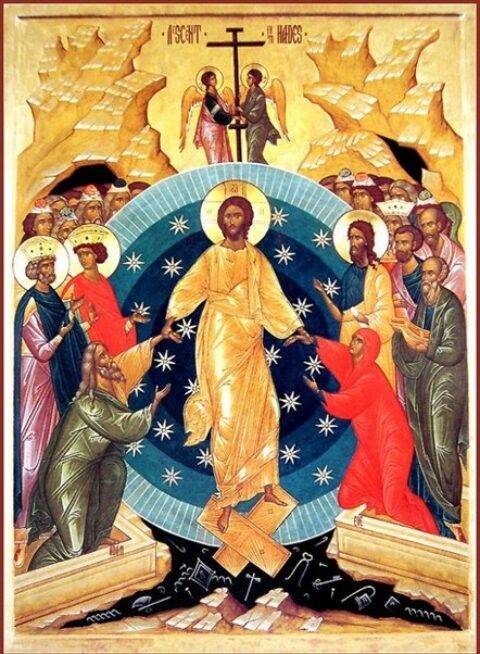
Calendar for April 21 Easter Monday
Early on Sunday, before dawn, Mary Magdalene, Mary the mother of James, Salome...
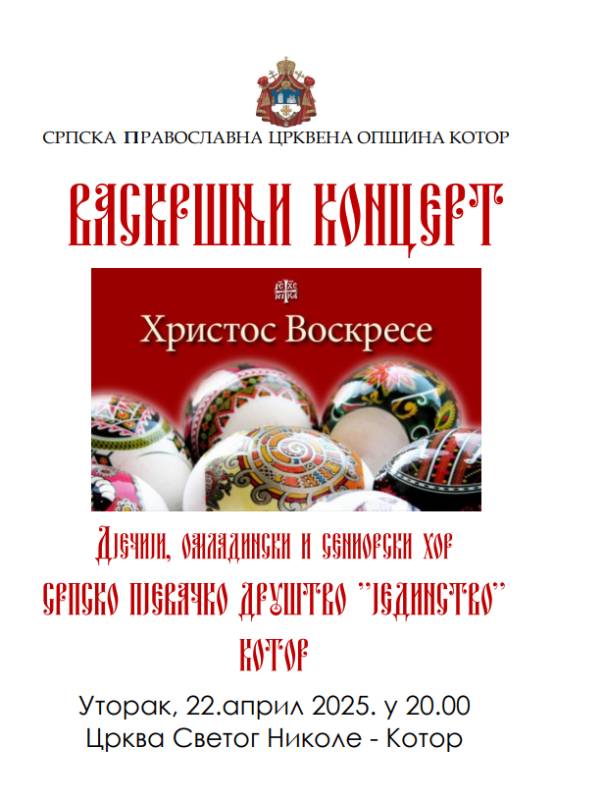
EASTER CONCERT OF THE SPD JEDINSTVO CHOIR
The Easter concert of the children's, youth and senior choirs of the...
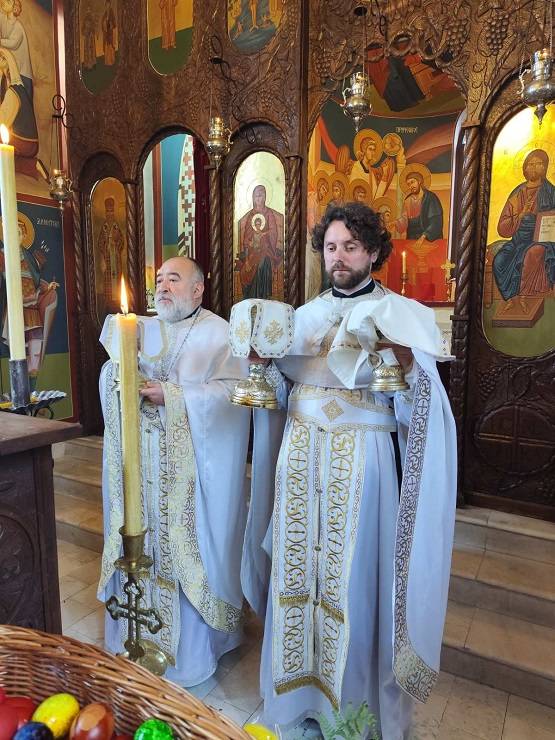
EASTER CELEBRATED LITURGICALLY IN THE CHURCH OF ST. VASILIJE OSTROŠKI IN DOBROTA
The Resurrection of Christ was celebrated liturgically today in the Church of...


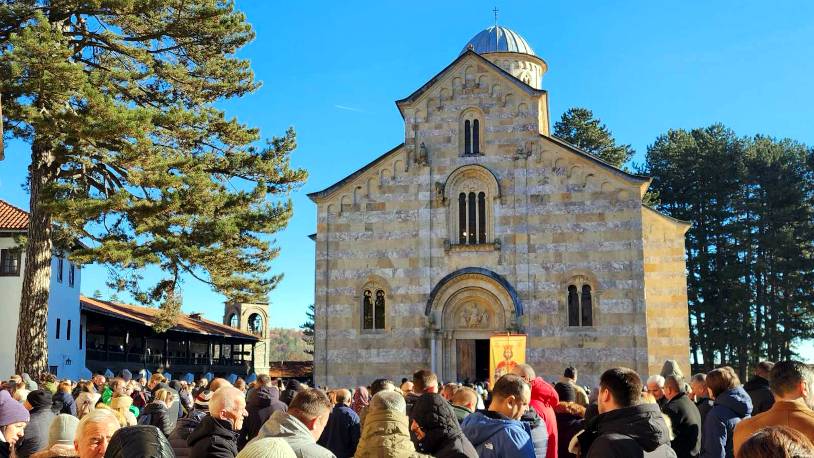

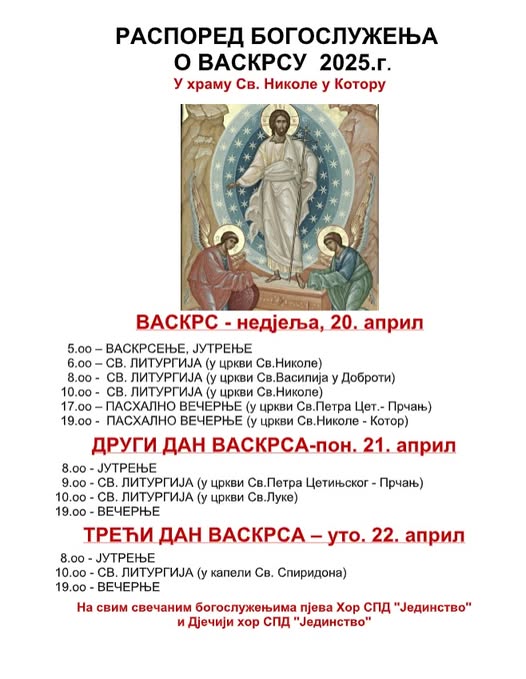
.png)